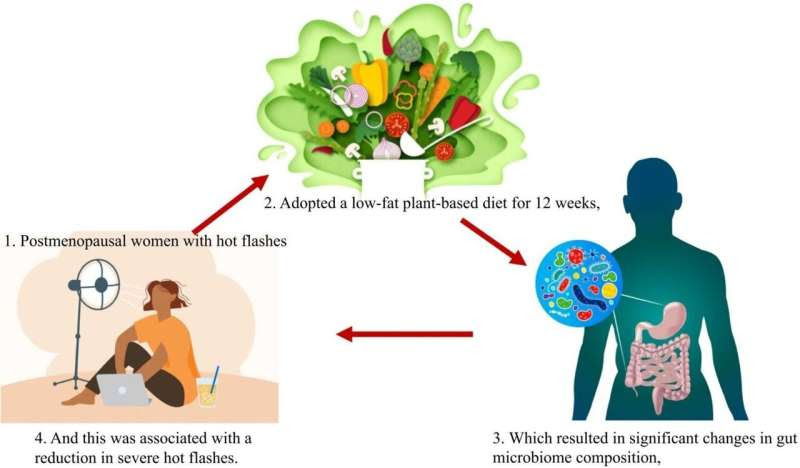by Physicians Committee for Responsible Medicine

Graphical Abstract. Credit: Complementary Therapies in Medicine (2023). DOI: 10.1016/j.ctim.2023.103002
A low-fat vegan diet that includes soy fosters changes in the gut microbiome that decrease postmenopausal vasomotor symptoms, or hot flashes, overall by 95%, according to a new study by the Physicians Committee for Responsible Medicine. A vegan diet also eliminated severe hot flashes, led to a 96% decrease in moderate-to-severe hot flashes, and reduced daytime and nighttime hot flashes by 96% and 94%, respectively. Participants also lost 6.4 pounds on average.
“Women who want to fight hot flashes should feed the bacteria in their gut a vegan diet rich in fruits, vegetables, grains, and beans, which also leads to weight loss and protects against heart disease and type 2 diabetes,” says study co-author Hana Kahleova, MD, Ph.D., director of clinical research at the Physicians Committee for Responsible Medicine.
The new research is a secondary analysis of the WAVS trial—the Women’s Study for the Alleviation of Vasomotor Symptoms—that the Physicians Committee previously published in the journal Menopause. In the study, 84 postmenopausal women reporting two or more moderate-to-severe hot flashes daily were randomly assigned to either the intervention group that was asked to follow a low-fat vegan diet, including a half cup of cooked soybeans a day, or to the control group that continued their usual diets for 12 weeks.
For the secondary analysis, stool samples from a subset of 11 participants were used to perform a gut microbiome analysis at baseline and after 12 weeks on a vegan diet. Changes in the amount of several families, genera, and species of bacteria were found.
The study is the first to find that reductions in the abundance of Porphyromonas and Prevotella corporis are associated with a reduction in severe day hot flashes. Prevotella corporis has also been found in the gut of people with rheumatoid arthritis and seems to have pro-inflammatory properties.
The decrease in the abundance of Clostridium asparagiforme was associated with a reduction in total severe and severe night hot flashes. Clostridium asparagiforme has also been found to produce trimethylamine-N-oxide, a compound associated with an increased risk of cardiovascular disease and type 2 diabetes. A decreased abundance of Clostridium asparagiforme may partially explain the beneficial effects of a plant-based diet on cardiovascular health and provide a possible link between hot flashes and incident cardiovascular disease.
Changes in the abundance of other bacteria looked at in the study may play a role in alleviating hot flashes by stabilizing estrogen levels, reducing inflammation, and increasing satiety, among other benefits.
The authors say that larger randomized clinical trials are needed to investigate these findings further.
The study is published in the journal Complementary Therapies in Medicine.
More information: Hana Kahleova et al, A dietary intervention for postmenopausal hot flashes: A potential role of gut microbiome. An exploratory analysis, Complementary Therapies in Medicine (2023). DOI: 10.1016/j.ctim.2023.103002
Journal information: Menopause
Provided by Physicians Committee for Responsible Medicine

Leave a Reply